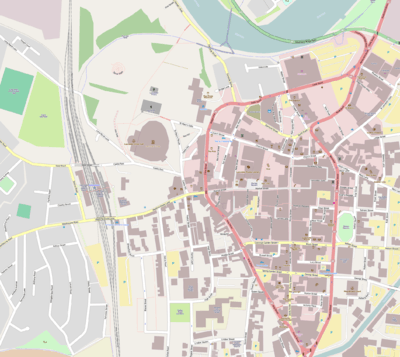Lancaster City Museum
| Lancaster City Museum | |
|---|---|
 The museum, seen across Market Square | |
 Location within Lancaster city centre | |
| Former names | Old Town Hall |
| General information | |
| Type | Museum |
| Town or city | Lancaster, Lancashire |
| Country | England |
| Coordinates | 54°02′56″N 2°48′06″W / 54.0489°N 2.8017°WCoordinates: 54°02′56″N 2°48′06″W / 54.0489°N 2.8017°W |
| Construction started | 1781 |
| Completed | 1783 |
| Opened | 1923 |
| Technical details | |
| Material | Sandstone ashlar with slate roof |
| Floor count | 3 |
| Design and construction | |
| Architect | Major Thomas Jarrett |
| Main contractor | Robert Charnley and Robert Dickinson |
| Website | |
|
www | |
Listed Building – Grade II* | |
| Official name | City Museum, The Old Town Hall |
| Designated | 22 December 1953 |
| Reference no. | 1194971 |
Lancaster City Museum is a museum in Lancaster, Lancashire, England. It is housed in the former town hall in the Market Square and includes the King's Own Royal Regiment Museum.[1] The museum was founded in 1923, and its collections illustrate the archaeology and history of the city and surrounding areas.[2] Among its highlights is the Lancaster Roman Tombstone, a memorial dating from c. 100 AD which was found locally in 2005. It depicts a Roman soldier on horseback with a decapitated opponent at his feet, and is described as "an iconic piece of Lancaster's dramatic past [giving] a crucial insight into the history of the county."[3] The museum has expressed an interest in acquiring the Viking-era Silverdale Hoard, discovered in the City of Lancaster district in 2011, for its collection.[4]
The Museums, Libraries and Archives Council granted the museum "Accredited" status;[5] since 1 October 2011 accreditation is a responsibility of Arts Council England.[6]
Lancaster Old Town Hall
The Old Town Hall building in which the museum is housed is recorded in the National Heritage List for England as a designated Grade II* listed building. It was designed by Major Thomas Jarrett and built between 1781-83, with a cupola added in 1782 to a design by Thomas Harrison. It was extended in 1871 and 1886. In 1910, the functions of the Town Hall were transferred to a new building in nearby Dalton Square. The old Town Hall was converted into a museum in 1923.[7]
The building is a two-storey structure built from sandstone ashlar, fronted by a projecting tetrastyle Tuscan portico. The façade presents five bays with round-arched windows and, in the centre under the portico, a round-arched door at the top of a set of four steps. The cupola surmounting the building has a square base with a second octagonal stage on the side of which is a clock face. Above is a round drum surrounded by a rotunda of Ionic columns, capped by a dome. The ground floor was originally open and contained an arcade housing a market for grain and butter. The openings to the arcade were later filled with the current ground-floor windows. The building has served a number of purposes over the years; as well as housing Lancaster's Council Chamber and subsequently the City Museum, it also housed the town court (complete with lock-ups) and branches of Barclays Bank (until 1969) and the National Westminster Bank (until 1977).[7]
See also
- Grade II* listed buildings in Lancashire
- Listed buildings in Lancaster, Lancashire
- List of works by Thomas Harrison
References
- ↑ "Lancaster City Museum". Lancashire Museums. Retrieved 19 December 2011.
- ↑ "The City Museum". Lancaster City Council. Retrieved 19 December 2011.
- ↑ "Lancaster Roman Tombstone". Lancashire Museums. Retrieved 19 December 2011.
- ↑ "Silverdale silver Viking hoard declared treasure". BBC News. 16 December 2011. Retrieved 19 December 2011.
- ↑ "List of Accredited Museums in the UK" (Excel spreadsheet). MLA. Retrieved 19 December 2011.
- ↑ "Museums". Arts Council England. Retrieved 19 December 2011.
- 1 2 Historic England, "City Museum, The Old Town Hall, Lancaster (1194971)", National Heritage List for England, retrieved 18 August 2013